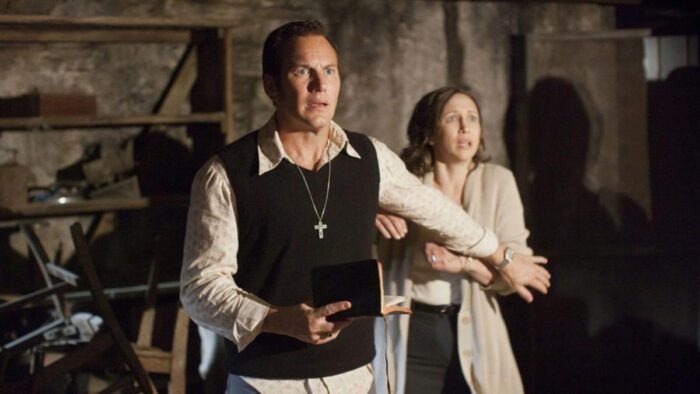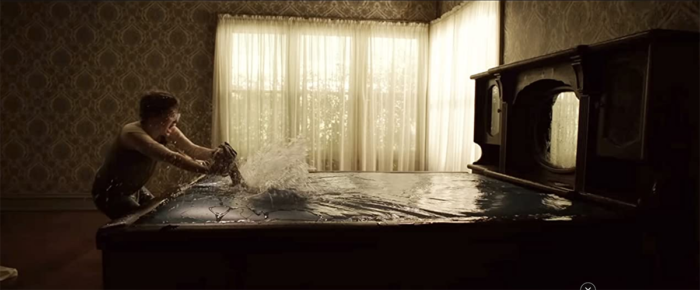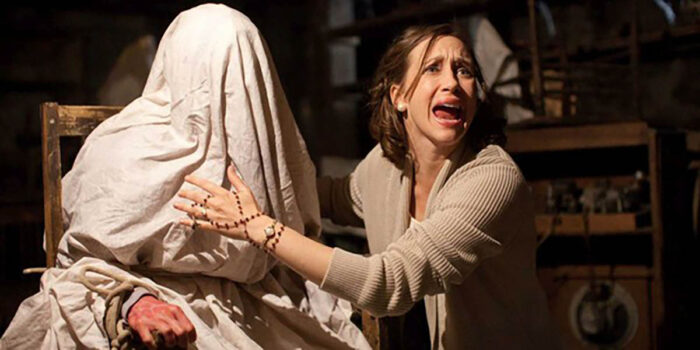Film Review: The Conjuring 3 – The Devil Made Me Do It
The Conjuring 3 – The third film in The Conjuring core series discards the simple claustrophobic basements of ‘70s and ‘80s America for grander sets and story, but fails to execute on its many tension-building threads throughout.
Starring: Patrick Wilson, Vera Farmiga, Ruairi O’Connor, Sarah Catherine Hook, Julian Hilliard, John Noble, Eugenie Bondurant
Another casualty from the collective global pause in entertainment, the third film in The Conjuring main series arrives on our screens a year after it was originally set to debut, when the reality of visiting the local supermarket has grown more recently terrifying than outdated demons and a lone cough is more terrifying than a silhouette in the shadows.
Directed by Michael Chaves, his second feature film since his directorial debut with The Curse of La Llorona in 2019, The Devil Made Me Do It marks a new step for the series, prying itself away from the formula which has made it so successful in recent years. Between The Conjuring, Annabelle and the Insidious series, the haunted-house genre of horror films seemed relatively set; a core set of demonic forces, formulaic stories and scenarios, and the occasional tension-relieving laugh.
It seems wanting to break the formula for a successful series means moving away from the elements that built such a successful foundation in the first place. Gone is the torturous inner struggle of Lorraine Warren (Vera Farmiga), instead replaced by a narrative involving Ed’s (Patrick Wilson) demonically weakened heart. This does two terrible things; muting Vera Farmiga’s exceptional range and emotional output, and presenting The Warrens as the caricatures they have been so often painted as.
Lorrain’s new, calmer exterior coupled with Ed’s constantly strained appearance just make the two seem victims of their own fame and imagination, quickly joining a murder investigation by guessing the correct murder weapon and receiving spiritual guidance at the site of a murder scene to determine what happened.
This no longer seems like a quiet, humble couple fighting demons in the dark, but an exploitative circus speaking in cliches and wedging themselves firmly into anything even remotely demonic. The lines of entertainment and reality blur when the otherwise by-the-book, murder-accused-thriller story throws in a powerful witch and swirls of dark magical dust passed through a grainy filter.
The direction is new, and somewhat fresh for the series, but does nothing to further the ‘two against the legion’ feel of the others. With the exception of the film’s first, haunting scene, the scares become signposted with momentary silence and over-the-shoulder framing that feels tired before it makes an appearance, and the few moments of potential comedy are so forced and poorly placed that you wonder if you’re watching a different film.
Patrick Wilson and Vera Farmiga still do their best here, but seem stifled by the script and the departure from the quiet close-ups of their previous performances, Ruairi O’Connor and Sarah Catherine Hook do an excellent job of playing the authentically terrified younger couple, though Hook’s measured performance almost seems slightly out of place given her complete innocence throughout.
The last act of the film dives headfirst into the lore of the story but focuses more on the material-world reality than the otherworldly demon involved, which seems somewhat wasted as we get the logically petty human explanation instead of the bizarre, incomprehensible madness that often comes with stories of demonic possession.
The narrative ties up what it can of itself neatly by the end of the film, but the result feels more like a side-story detour for The Warrens instead of a core chapter of their story, casting a spotlight on the vanity of The Warrens instead of some feral terror.
The horror that comes with ‘lost stories from middle America’ is the quiet relatability of them; where the demons of life take hold of us in the fractured peace of a suburban family dinner, not in the bright sanitation of a courtroom or a cobwebbed haunted house filled with spellbooks. The Devil Made Me Do It is a step up in terms of broader scope for the series’ narrative, but a step back for the lingering dread that once commanded such love for these films.
Oxford Lamoureaux
- The Dead South – Powerstation: April 5, 2024 (Concert Review) - April 6, 2024
- Queens of The Stone Age – Spark Arena: February 29, 2024 (Concert Review) - March 1, 2024
- Dune: Part Two – Dir: Denis Villeneuve (Film Review) - February 29, 2024



